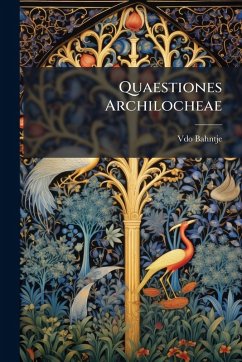Quaestiones Archilocheae is a scholarly dissertation presented in Latin, focusing on the works and life of Archilochus, the renowned Greek lyric poet from the 7th century BC. This work delves into critical questions surrounding Archilochus's poetry, exploring its linguistic nuances, historical context, and literary significance. Vdo Bahntje's study provides valuable insights into understanding the fragments and testimonia that constitute our knowledge of Archilochus, offering a rigorous examination of the poet's impact on early Greek literature and culture. A valuable resource for classicists and scholars of ancient literature, this dissertation contributes to the ongoing dialogue surrounding one of the most influential figures in archaic Greece. This work has been selected by scholars as being culturally important, and is part of the knowledge base of civilization as we know it. This work was reproduced from the original artifact, and remains as true to the original work as possible. Therefore, you will see the original copyright references, library stamps (as most of these works have been housed in our most important libraries around the world), and other notations in the work. This work is in the public domain in the United States of America, and possibly other nations. Within the United States, you may freely copy and distribute this work, as no entity (individual or corporate) has a copyright on the body of the work. As a reproduction of a historical artifact, this work may contain missing or blurred pages, poor pictures, errant marks, etc. Scholars believe, and we concur, that this work is important enough to be preserved, reproduced, and made generally available to the public. We appreciate your support of the preservation process, and thank you for being an important part of keeping this knowledge alive and relevant.
Bitte wählen Sie Ihr Anliegen aus.
Rechnungen
Retourenschein anfordern
Bestellstatus
Storno








